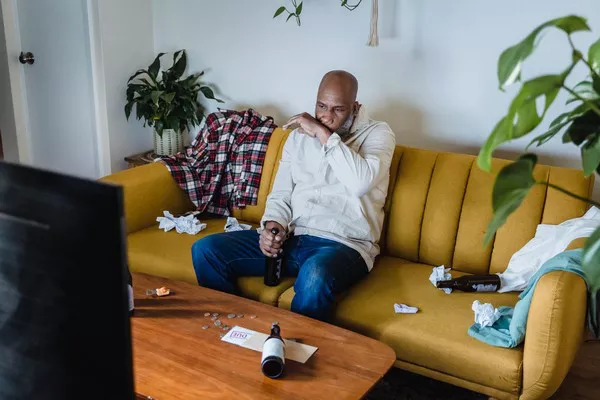Loving someone who causes you pain is one of the most emotionally challenging experiences a person can endure. Whether it’s a toxic relationship, emotional abuse, or simply a person who fails to meet your emotional needs, the desire to hold on to a relationship despite the hurt is common. However, staying attached to someone who consistently hurts you can hinder your emotional well-being and personal growth. From a psychological standpoint, learning how to let go and stop loving someone who hurts you requires a multifaceted approach that involves emotional awareness, self-compassion, and a commitment to healthier relationship dynamics.
The Psychological Conflict: Love vs. Self-Preservation
Love is one of the most profound emotions humans experience. It can evoke feelings of joy, fulfillment, and security. However, when love is intertwined with pain, it can become confusing and deeply distressing. The brain’s attachment system plays a key role in our emotional bonds with others. This system releases hormones such as oxytocin and dopamine, which create feelings of connection, pleasure, and bonding.
When you love someone who hurts you, the emotional conflict occurs because these chemicals can mask the pain and bind you to the person, even when logic and reason suggest that the relationship is unhealthy. Essentially, the brain becomes addicted to the highs of love while enduring the lows of emotional distress, making it difficult to detach.
On the other hand, psychological self-preservation—your brain’s drive for safety and emotional stability—becomes activated when you experience harm in a relationship. This is the part of you that tells you, “This is not healthy. You deserve better.” However, emotional attachment to the person you love can make it hard to listen to this voice of reason. The key challenge, therefore, is to find a balance between these conflicting forces and ultimately prioritize your emotional well-being.
1. Acknowledge the Pain and Break the Denial
The first step in stopping love for someone who hurts you is to confront the emotional reality of the situation. Denial can be a powerful defense mechanism that allows us to stay in toxic situations. You might tell yourself, “They didn’t mean it,” or “I can change them,” or “Maybe things will get better if I stay.” However, acknowledging the emotional pain is essential for healing.
Start by recognizing the hurt you’ve endured—whether it’s verbal abuse, emotional neglect, manipulation, or betrayal—and accept that it is affecting you deeply. Denying your feelings or suppressing them only prolongs the attachment and hinders your ability to move forward.
Psychologically, allowing yourself to feel the full range of emotions—anger, sadness, disappointment, and even grief—is vital to the healing process. Journaling or talking with a trusted friend or therapist about your feelings can help you process this pain and clarify the reality of the situation. Avoid minimizing the hurt, as doing so could reinforce unhealthy patterns of attachment.
2. Understand the Psychological Dynamics of Toxic Love
Often, people remain in harmful relationships because of complex psychological patterns. One common dynamic is the trauma bond, which refers to the deep emotional attachment formed between an abuser and their victim, often resulting from intermittent reinforcement. This occurs when the person who hurts you also shows moments of kindness, affection, or love, making it difficult to leave because you are hoping for more positive moments. These intermittent “rewards” keep you hooked, even though the overall relationship is damaging.
Another reason people stay in toxic relationships is rooted in self-esteem issues. If you have low self-worth or a history of unhealthy attachments, you may feel that this is the best you deserve or that you cannot find someone better. Understanding these psychological dynamics can help you break free from them and recognize that you are worthy of love that is nurturing and respectful.
Therapies such as Cognitive Behavioral Therapy (CBT) can be particularly effective in addressing these harmful thought patterns. CBT helps you identify and challenge negative beliefs about yourself and relationships, replacing them with healthier, more realistic perspectives.
3. Establish Healthy Boundaries
One of the most important steps in stopping love for someone who hurts you is to set clear boundaries. Healthy boundaries allow you to protect your emotional and mental health while reasserting control over your life. When you stay in a relationship with someone who harms you, you may lack proper boundaries, allowing the person to cross your limits emotionally, physically, or psychologically.
Setting boundaries can include:
Limiting contact: In some cases, it may be necessary to cut off contact completely, especially if the person continues to hurt you. If direct communication is impossible, consider blocking them on social media, changing your phone number, or seeking a no-contact agreement.
Emotional detachment: It’s essential to create an emotional distance from the person. This can mean stopping yourself from engaging in the cycles of emotional manipulation or rescuing them when they need help. You are not responsible for fixing them, especially at the cost of your own well-being.
Physical space: If living together or frequent contact is unavoidable (e.g., if you have children together or share mutual social circles), make sure to create physical space between you. This could mean spending more time apart, making your personal space sacred, and reducing shared activities.
Setting boundaries isn’t about being cruel or unkind; it’s about valuing your own health and happiness. Boundaries help you regain a sense of self-respect and autonomy.
4. Focus on Self-Love and Self-Care
In the process of letting go, it’s crucial to redirect your energy toward self-love and self-care. When you love someone who hurts you, you may become so focused on the other person’s needs and behavior that you neglect your own. In order to break free from this emotional entanglement, you need to prioritize yourself and practice self-compassion.
Self-care includes taking care of your physical, emotional, and mental well-being. This can involve:
Physical well-being: Regular exercise, healthy eating, and getting enough sleep can help you rebuild your strength and restore a sense of well-being.
Emotional healing: Engage in activities that bring you joy and peace. Surround yourself with positive, supportive people who encourage your growth. Meditation, mindfulness, and therapy can also be powerful tools for processing and releasing negative emotions.
Mental wellness: Educate yourself about unhealthy relationship dynamics, and focus on building a positive and empowered mindset. Reinforce your worth by reminding yourself of your strengths and the things you deserve in a relationship.
Practicing self-love means recognizing that you are worthy of love that makes you feel safe, valued, and appreciated—not someone who causes you pain.
5. Embrace the Healing Process
Letting go of someone you love is a painful and gradual process. There will be moments of doubt and sadness, but with time, the emotional attachment will loosen. Psychologically, healing requires patience, as the brain and body need time to recalibrate. You may experience grief over the loss of the relationship, which is a natural part of moving on.
It’s important to give yourself permission to grieve, but also to celebrate the progress you make each day. Focus on the future and the possibilities that await you when you let go of someone who has hurt you. Healing involves creating space for new experiences, new people, and new opportunities for growth.
Conclusion
Stopping love for someone who hurts you is not about erasing the love you once felt, but about freeing yourself from a relationship that no longer serves your emotional health. It is a journey of self-awareness, self-compassion, and self-empowerment. Through acknowledging the pain, understanding toxic relationship dynamics, setting boundaries, prioritizing self-care, and embracing the healing process, you can let go of someone who harms you and reclaim your emotional well-being. Though it may be difficult, the reward is a future filled with healthier, more fulfilling relationships and, most importantly, a deeper connection with yourself.
Related topics:




















